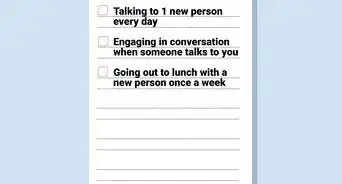This article was co-authored by Leslie Bosch, PhD. Dr. Leslie Bosch is a Developmental Psychologist, National Board Certified Health and Wellness Coach, and Owner of Bosch Integrative Wellness. With over 15 years of experience, she specializes in providing stress relief coaching services to individuals and groups using a variety of scientifically proven methods for change including motivational interviewing, positive psychology, self-compassion, non-violent communication, social learning theory, and self-determination theory. Dr. Bosch received training from the Andrew Weil Center for Integrative Medicine at the University of Arizona and earned a PhD in Human Development and Family Studies from The University of Arizona. She is also a member of the National Board of Health and Wellness Coaching Association. Dr. Bosch has published many papers and been featured in the media numerous times.
This article has been viewed 38,533 times.
While no two personalities are exactly alike, psychologists have found that most people have personalities that can be classified on a spectrum as being either more introverted or more extroverted. In this article, we'll show you how to figure out where you fall on the spectrum by considering how much you enjoy social situations, what your energy is like when you interact with people, and taking certain personal preferences into account.
Steps
-
1Consider your reactions around people. How do you act at a party, or around a large group of people?
- If you tend to be more of a listener than a talker, you might be an introvert. You would be more of a wallflower than the life of the party.
- If you are more talkative, you are likely to be an extrovert. People are drawn to you because you smile more and are comfortable to be around.
- Sometimes how you act also depends on how comfortable you are with the people around you.
-
2Think about your energy levels. What helps you to get your energy back? How do you mentally or emotionally recharge?
- Everyone needs to sleep but some people need time to be alone in order to get their energy back. These people are usually introverts.
- Extroverts get their energy from socializing and being around other people.
- Basically, most introverts need time to themselves "internally" and extroverts need to get everything out "externally".
Advertisement -
3Look at how you feel about new people. Do you find that it is easy to trust others you have just met or don't know very well?
- Introverts do not trust others as easily as extroverts do and tend to only have a few very good friends, and the rest they consider to be good acquaintances.
- Extroverts are usually more trusting and open and consider more people as friends than merely acquaintances.
-
4Think about your place in the workforce. Are you (or are you interested in becoming) a teacher, politician, or someone who has constant interaction with other people?
- Extroverts are more likely to seek out jobs that fit their personality, so if you have always loved public speaking, you might be an extrovert.
- Not all introverts avoid public speaking or jobs that require interactions with others such as acting, politics, or being an attorney. Some introverts learn to act more social, while many others choose to have a less social work place. Some like to have jobs they can do from home or in an office cubicle.
-
5Consider the full spectrum of possibilities. It's rare for someone to be completely introverted or completely extroverted, just as it's rare for someone to be completely governed by the right or left hemisphere of their brain. An ambivert is a person who is equally extroverted as they are introverted.
-
6Examine your approach to thoughts and feelings. Do you think or feel more?
- Introverts are found to have more blood flow in the frontal lobes, and frontal thalamus of the brain, which is used for planning and problem solving.[citation needed]
- In extroverts, more blood flow goes to the anterior cingulate gyrus, and the temporal lobes, which are used to process sensory and emotional stimulation.[citation needed]
- Don't generalize others by these traits––not all introverts rely on thinking and not all extroverts rely on feeling.
-
7Consider your need for privacy. When you go into your room or office, do you leave the door open, or close it?
- Introverts like their privacy and they are more likely to want to keep doors closed.
- Extroverts don't mind leaving their doors open, because they are more interested in socializing than being alone.
-
8Realize that people can learn to go "against type" in certain situations.
- Do you find yourself trying to speak louder and speak more often with people whom you have just met? Do you act the same way with your close friends, or do you act more introverted and feel more natural? You might be an introvert.
- An extrovert may act more introverted if they feel they need to. Sometimes being quiet is polite in certain situations. Do you find that if you are taking a test in school, or finishing up paperwork at your job that you have to strive not to be distracted by social situations around you? Is it easy for you to talk to people but hard for you to stay quiet?
Expert Q&A
-
QuestionCan an extrovert become an introvert?
 Leslie Bosch, PhDDr. Leslie Bosch is a Developmental Psychologist, National Board Certified Health and Wellness Coach, and Owner of Bosch Integrative Wellness. With over 15 years of experience, she specializes in providing stress relief coaching services to individuals and groups using a variety of scientifically proven methods for change including motivational interviewing, positive psychology, self-compassion, non-violent communication, social learning theory, and self-determination theory. Dr. Bosch received training from the Andrew Weil Center for Integrative Medicine at the University of Arizona and earned a PhD in Human Development and Family Studies from The University of Arizona. She is also a member of the National Board of Health and Wellness Coaching Association. Dr. Bosch has published many papers and been featured in the media numerous times.
Leslie Bosch, PhDDr. Leslie Bosch is a Developmental Psychologist, National Board Certified Health and Wellness Coach, and Owner of Bosch Integrative Wellness. With over 15 years of experience, she specializes in providing stress relief coaching services to individuals and groups using a variety of scientifically proven methods for change including motivational interviewing, positive psychology, self-compassion, non-violent communication, social learning theory, and self-determination theory. Dr. Bosch received training from the Andrew Weil Center for Integrative Medicine at the University of Arizona and earned a PhD in Human Development and Family Studies from The University of Arizona. She is also a member of the National Board of Health and Wellness Coaching Association. Dr. Bosch has published many papers and been featured in the media numerous times.
Developmental Psychologist Yes, people can grow in all of their personality dimensions. People can learn to be able to tolerate alone time and to feel comfortable with that. This is a really good idea to grow the capacity of the parts of your personality because the more flexible you can be, the better off you're going to be in the long run.
Yes, people can grow in all of their personality dimensions. People can learn to be able to tolerate alone time and to feel comfortable with that. This is a really good idea to grow the capacity of the parts of your personality because the more flexible you can be, the better off you're going to be in the long run. -
QuestionCan an introvert become an extrovert?
 Leslie Bosch, PhDDr. Leslie Bosch is a Developmental Psychologist, National Board Certified Health and Wellness Coach, and Owner of Bosch Integrative Wellness. With over 15 years of experience, she specializes in providing stress relief coaching services to individuals and groups using a variety of scientifically proven methods for change including motivational interviewing, positive psychology, self-compassion, non-violent communication, social learning theory, and self-determination theory. Dr. Bosch received training from the Andrew Weil Center for Integrative Medicine at the University of Arizona and earned a PhD in Human Development and Family Studies from The University of Arizona. She is also a member of the National Board of Health and Wellness Coaching Association. Dr. Bosch has published many papers and been featured in the media numerous times.
Leslie Bosch, PhDDr. Leslie Bosch is a Developmental Psychologist, National Board Certified Health and Wellness Coach, and Owner of Bosch Integrative Wellness. With over 15 years of experience, she specializes in providing stress relief coaching services to individuals and groups using a variety of scientifically proven methods for change including motivational interviewing, positive psychology, self-compassion, non-violent communication, social learning theory, and self-determination theory. Dr. Bosch received training from the Andrew Weil Center for Integrative Medicine at the University of Arizona and earned a PhD in Human Development and Family Studies from The University of Arizona. She is also a member of the National Board of Health and Wellness Coaching Association. Dr. Bosch has published many papers and been featured in the media numerous times.
Developmental Psychologist Yes, absolutely. They can improve their communication skills. They can learn presentation skills to share things about themselves.
Yes, absolutely. They can improve their communication skills. They can learn presentation skills to share things about themselves.
References
- http://www.careerbuilder.com/article/cb-2413-job-info-trends-10-jobs-for-extroverts/ – research source
- http://giftedkids.about.com/od/glossary/g/extrovert.htm – research source
- http://giftedkids.about.com/od/glossary/g/introvert.htm – research source
- https://en.wikipedia.org/wiki/Extraversion_and_introversion – research source
- http://www.ted.com/talks/susan_cain_the_power_of_introverts – research source



































































